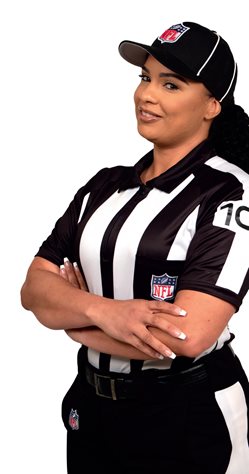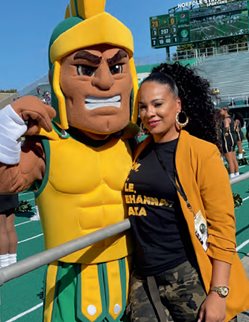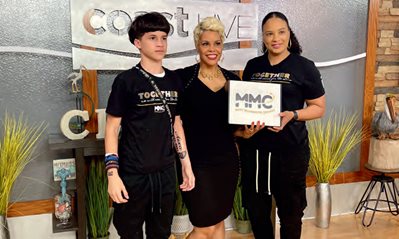Hard Work, Perseverance Leads 2006 Alumna To Become First Female African American Official
 It takes stamina, grit and perseverance to be a National Football League official, and Maia Chaka, Norfolk State University class of 2006, is no stranger to those attributes. After years of officiating football games at the local, regional and college levels, she became the league’s first female African American official in 2021. While her path to that milestone was complicated and challenging, it started at Norfolk State University. And there’s a sense of destiny to her story that started long before she existed.
It takes stamina, grit and perseverance to be a National Football League official, and Maia Chaka, Norfolk State University class of 2006, is no stranger to those attributes. After years of officiating football games at the local, regional and college levels, she became the league’s first female African American official in 2021. While her path to that milestone was complicated and challenging, it started at Norfolk State University. And there’s a sense of destiny to her story that started long before she existed.
“The gym that is Echols Hall is named after my great uncle,” Chaka said. “He officiated 32 years [of ] basketball and football in the CIAA. He officiated the Pan African Games for basketball. So, he was a pretty good basketball official back in the ’40s, ’50s, and ’60s, where Black people weren’t even considered human. He was able to cross all kinds of racial barriers and boundaries just being him. And looking through his photo album that inspired me to always want to officiate.”
“And then, when I was here at Norfolk State, and I was working on my Health and PE degree, I needed to find multiple streams of income,” she said. “I didn’t want to become just a PE teacher.” She thought it was important to have those options after graduation, so she pursued work study through Student Activities where she officiated flag football and intramural basketball.
 In fact, she was dared into becoming an official.
In fact, she was dared into becoming an official.
“I used to heckle them, the same way everybody else heckles bad referees,” Chaka said. “So, one of the guys said ‘Well, if you think you can do it, why don’t you come out here and try.’ And that always just stuck in my head.”
She was dared to do better, so she took up officiating intramurals just to prove somebody wrong, but she did it throughout the rest of college.
A year after graduating to become a high school physical education teacher in Virginia Beach, she was again looking for a way to supplement her income.
That’s when a co-worker “forced her” to go to an interest meeting to officiate high school football “because there weren’t any women doing football at the time,” according to Chaka. So, she used her experience doing intramurals to move into officiating high school Pop Warner football games.
Once she took on officiating high school football, she worked all the time. Chaka was “constantly working” and never turned down an assignment.
“And that’s key,” she said. “Whenever you’re trying to be successful, when you want to be good at something, you have to put the time in…you have to put that work in, in order to get better.”
 And the work paid off. After three years of experience, she became the first woman in Virginia to officiate a high school state championship. That helped her move up to Division I college football, a very rare opportunity for high school officials. Most officials move from high school to small college football, but not Chaka. She went straight to Division I in Conference USA.
And the work paid off. After three years of experience, she became the first woman in Virginia to officiate a high school state championship. That helped her move up to Division I college football, a very rare opportunity for high school officials. Most officials move from high school to small college football, but not Chaka. She went straight to Division I in Conference USA.
She credits the big leap to being at an officiating training camp where she was the only female and only Black person in the room. She said Gerald Austin, a longtime NFL official who would become her mentor, gave her the opportunity in Conference USA because of seeing how she handled herself so professionally in that very challenging situation.
She admits, though, that she was not qualified at first. Chaka had to live up to the potential Austin saw in her.
“Because you’re not qualified, doesn’t mean that you don’t have the potential,” Chaka said. “It’s the same as how when you draft a player as a rookie, you know they got the potential to be what they are, but you still have to put the work in to be successful.”
She loved officiating at the high school level because she loved learning something new and loved the growth process.
“But once I started Division I football, then it became tough,” Chaka said.
 “Because now we’re flying out of town. I had games in El Paso, Texas. I had games in Shreveport, Louisiana.” She’d fly out on a Friday after school, work a Saturday game, then fly home Sunday and go back to work teaching PE on Monday.
“Because now we’re flying out of town. I had games in El Paso, Texas. I had games in Shreveport, Louisiana.” She’d fly out on a Friday after school, work a Saturday game, then fly home Sunday and go back to work teaching PE on Monday.
While she wasn’t aware of it at the time, the grueling workload was preparing her for the National Football League.
Her mentor and Conference USA supervisor Gerald Austin had worked many years in the NFL and even had some Super Bowls to his credit. Chaka describes him as a good judge of talent, and he put her with good officials who would go on to the NFL. And, after a few years of Division I, Austin had people from the NFL come out to scout her performance.
“Once you’re working in one job, if you want to get promoted, your bosses have to speak up for you and speak well for you,” Chaka said. “And that’s with every college conference, not just mine…that’s how the NFL does it. There’s no application.”
Chaka says there’s a three-tier process and the NFL has around 2,000 officials every year in their scouting pool. Officials move up the tiers through excellence, persistence and discipline, both on the field and off.
 “You just have to continue to put in the work and wait your time,” Chaka said. “Your work is always going to rise to the top. It’s always going to outshine anybody else.”
“You just have to continue to put in the work and wait your time,” Chaka said. “Your work is always going to rise to the top. It’s always going to outshine anybody else.”
Chaka said NFL training “is just like college.” A 200-question pre-test prepares potential officials to take a 200-question entry test. Then there are training camps, pre-season games, fitness tests, and tests on their officiating mechanics: being in the right spot on the field at the correct time.
“We’re judged,” she said. “As soon as we step on the field, we’re judged from that point on until we get on the bus. So, someone’s looking at our every move.”
And it wasn’t easy for Chaka. While most NFL officials are “in training” for two or three years, it took Chaka seven years to make it to the big league, “twice as long,” she said.
While her rookie year in 2021 was challenging, she looks forward to staying in the league.
“I was the only rookie [official] in the league last year, so I got the rookie treatment,” she said. “But I’m worried about what my grades say or my supervisor says because I’m trying to stay in the league.”
Chaka looks forward to a successful year this year and hopes to make it into the post-season officiating crews. “I’m shooting for that 99.9; I’m shooting for accuracy.” And then, after five years of successful officiating, maybe fans will see her in a Super Bowl.
In the meantime, Chaka recently started up a nonprofit foundation — Make Meaningful Change. As a retired Virginia Beach educator, Make Meaningful Change gives her an outlet to continue caring for youth and supporting education. The organization’s website is www.makemeaningfulchange.org.
Watch our entire May 11, 2022, interview with Maia Chaka. Chloe-Ryan Woolfolk, the editor-in chief of the Spartan Echo student newspaper, served as our guest host.